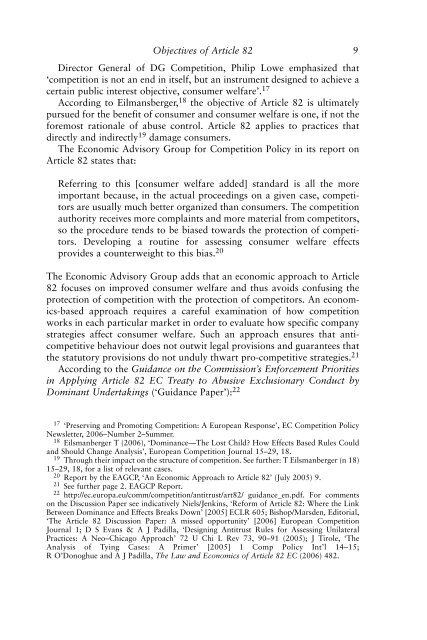Abuse of Economic Dependence - The Centre for European Policy ...
Abuse of Economic Dependence - The Centre for European Policy ...
Abuse of Economic Dependence - The Centre for European Policy ...
Create successful ePaper yourself
Turn your PDF publications into a flip-book with our unique Google optimized e-Paper software.
Objectives <strong>of</strong> Article 82 9<br />
Director General <strong>of</strong> DG Competition, Philip Lowe emphasized that<br />
‘competition is not an end in itself, but an instrument designed to achieve a<br />
certain public interest objective, consumer welfare’. 17<br />
According to Eilmansberger, 18 the objective <strong>of</strong> Article 82 is ultimately<br />
pursued <strong>for</strong> the benefit <strong>of</strong> consumer and consumer welfare is one, if not the<br />
<strong>for</strong>emost rationale <strong>of</strong> abuse control. Article 82 applies to practices that<br />
directly and indirectly 19 damage consumers.<br />
<strong>The</strong> <strong>Economic</strong> Advisory Group <strong>for</strong> Competition <strong>Policy</strong> in its report on<br />
Article 82 states that:<br />
Referring to this [consumer welfare added] standard is all the more<br />
important because, in the actual proceedings on a given case, competitors<br />
are usually much better organized than consumers. <strong>The</strong> competition<br />
authority receives more complaints and more material from competitors,<br />
so the procedure tends to be biased towards the protection <strong>of</strong> competitors.<br />
Developing a routine <strong>for</strong> assessing consumer welfare effects<br />
provides a counterweight to this bias. 20<br />
<strong>The</strong> <strong>Economic</strong> Advisory Group adds that an economic approach to Article<br />
82 focuses on improved consumer welfare and thus avoids confusing the<br />
protection <strong>of</strong> competition with the protection <strong>of</strong> competitors. An economics-based<br />
approach requires a careful examination <strong>of</strong> how competition<br />
works in each particular market in order to evaluate how specific company<br />
strategies affect consumer welfare. Such an approach ensures that anticompetitive<br />
behaviour does not outwit legal provisions and guarantees that<br />
the statutory provisions do not unduly thwart pro-competitive strategies. 21<br />
According to the Guidance on the Commission’s En<strong>for</strong>cement Priorities<br />
in Applying Article 82 EC Treaty to Abusive Exclusionary Conduct by<br />
Dominant Undertakings (‘Guidance Paper’): 22<br />
17 ‘Preserving and Promoting Competition: A <strong>European</strong> Response’, EC Competition <strong>Policy</strong><br />
Newsletter, 2006–Number 2–Summer.<br />
18 Eilsmanberger T (2006), ‘Dominance—<strong>The</strong> Lost Child? How Effects Based Rules Could<br />
and Should Change Analysis’, <strong>European</strong> Competition Journal 15–29, 18.<br />
19 Through their impact on the structure <strong>of</strong> competition. See further: T Eilsmanberger (n 18)<br />
15–29, 18, <strong>for</strong> a list <strong>of</strong> relevant cases.<br />
20 Report by the EAGCP, ‘An <strong>Economic</strong> Approach to Article 82’ (July 2005) 9.<br />
21 See further page 2. EAGCP Report.<br />
22 http://ec.europa.eu/comm/competition/antitrust/art82/ guidance_en.pdf. For comments<br />
on the Discussion Paper see indicatively Niels/Jenkins, ‘Re<strong>for</strong>m <strong>of</strong> Article 82: Where the Link<br />
Between Dominance and Effects Breaks Down’ [2005] ECLR 605; Bishop/Marsden, Editorial,<br />
‘<strong>The</strong> Article 82 Discussion Paper: A missed opportunity’ [2006] <strong>European</strong> Competition<br />
Journal 1; D S Evans & A J Padilla, ‘Designing Antitrust Rules <strong>for</strong> Assessing Unilateral<br />
Practices: A Neo–Chicago Approach’ 72 U Chi L Rev 73, 90–91 (2005); J Tirole, ‘<strong>The</strong><br />
Analysis <strong>of</strong> Tying Cases: A Primer’ [2005] 1 Comp <strong>Policy</strong> Int’l 14–15;<br />
R O’Donoghue and A J Padilla, <strong>The</strong> Law and <strong>Economic</strong>s <strong>of</strong> Article 82 EC (2006) 482.


